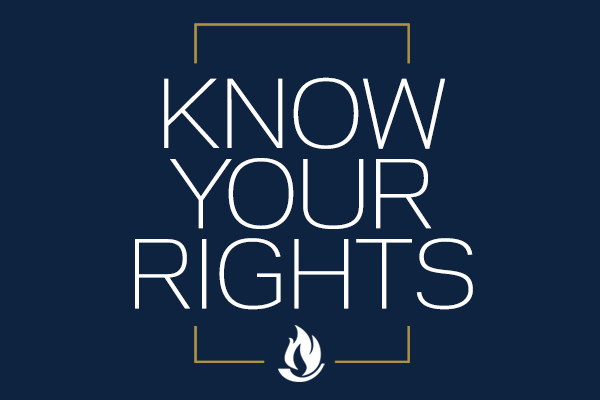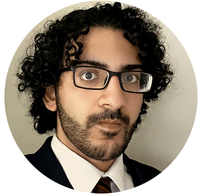

The Klau Institute for Civil and Human Rights, at the Keough School of Global Affairs, is preparing to launch a new initiative aimed at helping to create a more informed citizenry. "Know Your Rights" is designed to strengthen local civil rights education systems and, in the process, support democratic participation.
We spoke with Annad Khraisat, a second-year law student at Notre Dame and research assistant responsible for coordinating the initiative.
Know Your Rights is intended to support civil rights education in the community. Can you give us an overview of why the Klau Institute perceived a need for this program?
Especially in South Bend proper, but everywhere in this country, a lot of civil and individual rights violations occur. Not just because the perpetrator violates those rights, but because the people who are victims of these offenses don't know what their rights are, or how they can go about bringing them up and making sure that they're protected in the moment before it becomes a problem.
A common example is this. Someone is driving and gets pulled over by the police. The officer asks for license and registration, and tells them that they have to search the car. Without presenting a warrant, for the most part, these searches are suspect without probable cause. But if an officer of the law tells them that they have to search the vehicle, what are they going to do? They’re going to say, officer, go ahead, search the vehicle. They don't want to ask to see a warrant or talk to an attorney because they're afraid that maybe they don't have the rights here that they think they do. And they're afraid to escalate the situation, because it might end up worse for them. We want to make sure that in these kinds of contexts, people come prepared with the knowledge of what their rights are and how to protect themselves.
Are there other situations that don't involve law enforcement where people's rights and lack of knowledge about their rights could come into play?
From a civil rights point of view, freedom of speech in schools or freedom of practice of religion are good examples. Let's say a student is wearing a hijab in school, and the dress code requires that all women wear their hair down between shoulder and elbow length and she gets cited for a dress code violation. That dress code violation, as applied, violates her rights to freedom of practice of religion, but that child isn't going to know that. Maybe the parents of that child, if they're immigrants or if they're low income, might not have the resources to challenge that decision and allow their child to really be who they are in school as well as at home.
Will the initiative focus solely on constitutional rights?
For the most part we are going to talk about constitutional rights because they often come to the fore whenever these conversations happen. But we'll also talk about more state-specific rights. For instance, in many states landlords have certain duties as to their tenants. A common issue, especially with lower income housing, is landlords unethically shutting off heat or trying to force their tenants out in ways that they don't have the right to do. A tenant has the right to stay and demand access for those services such as heat, water, electricity.
"This project embodies Notre Dame's mission of service. We hope to take the opportunity to give back, to benefit and support the community that supported this university for so long."
How is Know Your Rights being structured, and how will it work in the community?
The primary focus of this program is to supplement current civil rights education. What that means is that we're working with nonprofits in the community and also other community organizations. That means nonprofit organizations like private schools and churches in the area. We're hoping to really tap into every sort of demographic that South Bend has here, from ethnic demographics, to age, to jobs, to income levels, and just across the board, make sure that everyone knows what their rights are and how to exercise them.
It's going to be structured as a volunteer program. We will have both law students and undergraduates, people who have studied this and people who are ready and able to enthusiastically teach large audiences about individual rights. The law student will be taking charge in coordination and planning with the undergraduate student, but the idea is that they'll have equal roles in the presentation of the materials and the answering of questions from the audience.
Prior to each event we will have training sessions when the undergraduate and the law student cover exactly what's going to go on, exactly what materials they're going to cover. We'll coordinate with local community groups and set dates and times for these seminars, which will be supplemental to their current educational materials. So if, for example, an organization already teaches about your rights at a police stop, we're not going to cover the same material. We're there to add more detail or more scope in terms of the topics covered.
What are some of the local organizations you are working with on this project?
La Casa de Amistad, most definitely the League of Women's Voters, and the South Bend Tenants Association are the main three. We are still in dialogue with several other organizations in the South Bend community. Because it's educational there's really not much of a need to communicate with law enforcement on this. If police officers want to come to these events they are more than welcome to, as is every member of the community.
Will the program be open to any undergraduate at Notre Dame?
Yes, any undergraduate can volunteer for this, as can any law student. Depending on how many events we have and the number of students who volunteer we'll likely stay consistent with the pool of volunteers. This will help develop a more personal connection between volunteers and organizations.
This happens to be kicking off in an election year. Is that a coincidence or do you see this as a way of supporting democracy?
It's both. This was just the right time to launch the program because all the pieces were in place. Now that it's election year, however, it does bring some issues to light. People in the community might have more concerns as they're highlighted throughout the election cycle. While we won't advocate for any particular political side, of course, we will be more responsive. So if at some point during the election a topic in regards to civil and individual rights comes to prominence and we don't already have materials on it and no other organization in the community has materials on it, we'll turn to developing those education materials.
We are lucky in that South Bend already has several voting rights groups that do provide education, specifically the League of Women's Voters, but we do hope to work with them to expand the materials and iniperson meetings.
What are your hopes for the project?
What we hope is that this motivates people to apply more pressure on law enforcement and other governmental groups, let's say school administrations or city planners, to be respectful of their rights. And in some situations, an individual police officer or city planner might not know that other people have these sort of rights, and they might be more respectful of them in the future.
This project embodies Notre Dame's mission of service. Especially this year we've seen some decline in service projects and missions led by students. We hope to change that and take the opportunity to give back, to benefit and support the community that supported this university for so long.